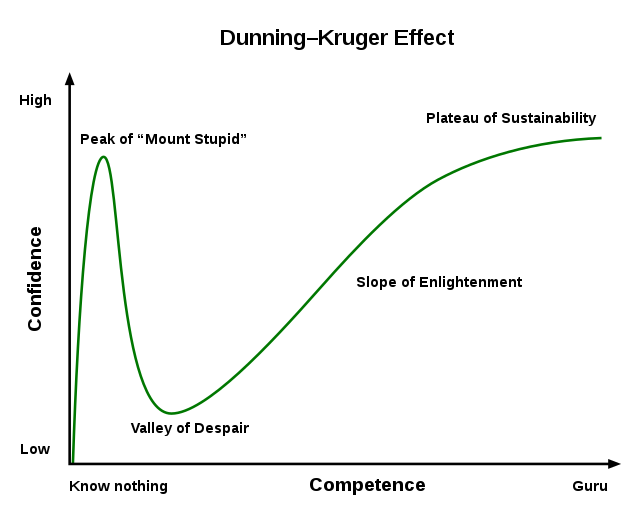Understanding the Dunning-Kruger Effect: A Deep Dive
Written on
Chapter 1: Introduction to the Dunning-Kruger Effect
You may have encountered individuals who confidently present themselves as experts in a specific area, only for you to realize upon further inspection that their knowledge is superficial at best. This phenomenon is known as the Dunning-Kruger effect, a psychological syndrome where individuals overestimate their own abilities. In this section, we will explore the essence of this effect, how to identify those affected, and its counterpart, the impostor syndrome.
The Dunning-Kruger effect refers to a situation where individuals significantly misjudge their own competence. They perceive themselves as knowledgeable, even when their understanding is limited. This concept was named after psychologists David Dunning and Justin Kruger, who, through experiments conducted in 1999 at Cornell University, uncovered this discrepancy in self-assessment.
Their research revealed two critical insights:
- Students who performed poorly rated their skills higher than their actual performance.
- Conversely, students with strong results often felt that their abilities were below average.
The Dunning-Kruger effect can be delineated into four distinct stages, which illustrate how those affected can become trapped in a cycle of overconfidence.
Section 1.1: The Four Stages of the Dunning-Kruger Effect

The graph shows how confidence in discussing a subject evolves based on one's experience and understanding.
Individuals with low competence often overrate their abilities and fail to recognize their limitations. This lack of insight makes it challenging for them to escape this cycle. Those exhibiting the Dunning-Kruger effect may also display ignorance and resistance to constructive feedback, leading them to underestimate the capabilities of others.
Section 1.2: Everyday Examples of the Dunning-Kruger Effect
The Dunning-Kruger effect is a common occurrence, observable in various aspects of daily life. Here are a few relatable instances:
- Driving: Typically, the worst drivers tend to believe they are the best.
- Public Figures: For example, former President Donald Trump is often cited as someone displaying signs of this effect.
- Conspiracy Theorists: Many individuals in this group reject scientifically supported facts, demonstrating a clear disconnect from reality.
- Sports Fans: Some football enthusiasts believe they possess more tactical knowledge than professional coaches.
- Notable Cases: Arthur McWheeler, a bank robber, believed lemon juice would make him invisible, leading to his swift arrest.
Chapter 2: The Impostor Syndrome: The Flip Side
The first video titled "Why Dummies Think They're Smart | The Dunning-Kruger Effect, Explained" delves into the psychological mechanisms behind this phenomenon, illustrating how overconfidence can distort self-perception.
Another psychological phenomenon, the impostor syndrome, stands in stark contrast to the Dunning-Kruger effect. Individuals experiencing impostor syndrome doubt their abilities excessively, often feeling like frauds who fear being exposed as incompetent.
Common thoughts among those affected include:
- "What am I doing here?"
- "People will soon see that I lack real skills."
- "I won’t succeed."
While many experience these thoughts occasionally, persistent feelings of being an impostor indicate a deeper issue. Those with impostor syndrome are often more competent than they perceive, suffering from an inaccurate self-assessment.
Section 2.1: Overcoming the Dunning-Kruger Effect
To combat the Dunning-Kruger effect, individuals can adopt several strategies:
- Embrace Humility: Recall Socrates’ wisdom: "I know that I know nothing." Acknowledge your limits.
- Practice Self-Reflection: Regularly evaluate your skills and achievements, maintaining a healthy level of self-criticism without tipping into impostor syndrome.
- Commit to Learning: Keep an inquisitive mindset and continuously seek to expand your knowledge.
- Seek Feedback: Regularly obtain input from those around you to gain a clearer understanding of your capabilities.
Section 2.2: Self-Assessment: Are You Affected?
If you suspect you might be experiencing the Dunning-Kruger effect, consider this self-test. While not an official psychological evaluation, it can serve as a helpful guideline. Answer the following questions with "yes" or "no":
- Do people often seek your advice when they face challenges?
- Does feedback from others match your self-assessment of your skills?
- When you encounter failure, do you hold yourself accountable rather than blaming external factors?
- Do you actively pursue knowledge in areas of interest?
- Have you successfully assisted others with their tasks, leading them to seek your help repeatedly?
If you answered "yes" to all questions, it's unlikely you experience the Dunning-Kruger effect. If you answered "yes" to at least three, the likelihood remains low. However, answering "yes" two times or fewer may indicate a need to reassess your self-perception. Consider seeking feedback from friends or family and remain open to constructive criticism.
Thank you for taking the time to read this exploration of the Dunning-Kruger effect. If you found this article informative, consider subscribing to my email list to receive updates directly to your inbox!
If you enjoyed this content, you might also like:
- The Milgram Experiment: Exploring the Limits of Obedience
- Flow State: Unlocking Your Potential for Productivity
- The Bystander Effect: Understanding Collective Inaction